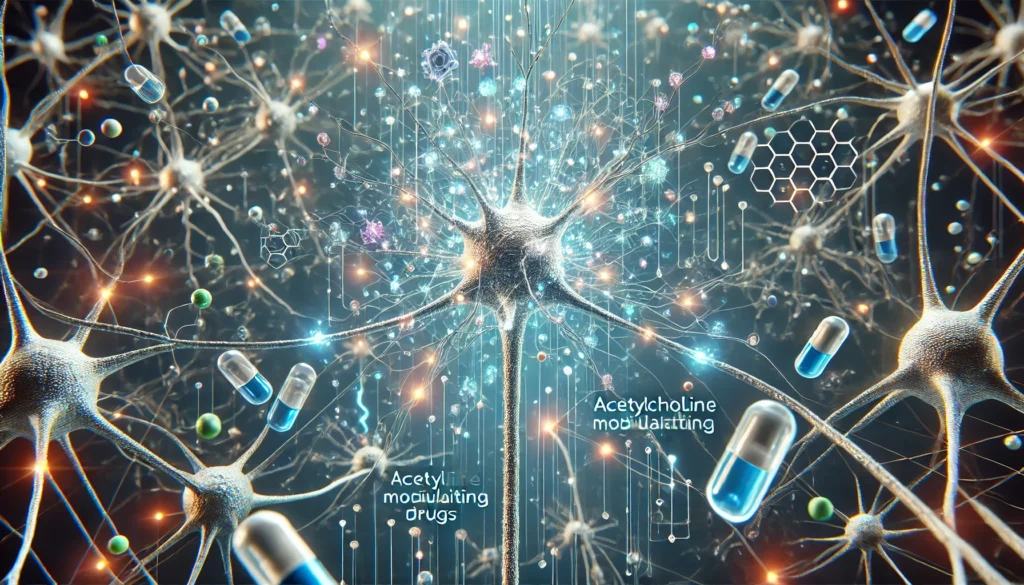Introduction
Acetylcholine, a crucial neurotransmitter in the human nervous system, plays a significant role in memory, cognition, and mood regulation. It is essential for various bodily functions, including muscle control, attention, and learning. However, certain drugs can influence acetylcholine levels, either enhancing or inhibiting its activity, leading to profound effects on cognitive health. Medications classified as acetylcholine blockers and acetylcholine medications can alter brain function, impacting individuals with neurological conditions, psychiatric disorders, and even those using certain treatments for common ailments. Understanding how drugs that affect acetylcholine work is essential for optimizing cognitive performance and managing potential side effects.
You may also like: Piracetam Side Effects: What to Expect and How to Minimize Risks
This article will explore the mechanisms through which these drugs influence acetylcholine activity, their effects on memory and mood, and the potential risks and benefits associated with their use. By analyzing current scientific research, this discussion will provide valuable insights into how these drugs impact the brain and overall well-being.
The Role of Acetylcholine in the Brain
Acetylcholine is one of the most important neurotransmitters in the human body, serving as a chemical messenger between nerve cells. It is integral to the proper functioning of the central and peripheral nervous systems. In the brain, acetylcholine is essential for memory formation, learning, and attention. It also plays a vital role in regulating mood, with imbalances often associated with conditions such as depression and anxiety.
Neurons that produce and release acetylcholine, known as cholinergic neurons, are predominantly found in regions of the brain associated with cognition, such as the hippocampus and cerebral cortex. These neurons help modulate synaptic plasticity, a process crucial for learning and memory. Additionally, acetylcholine is involved in neuroprotection, helping to maintain the integrity of brain cells and reduce the risk of neurodegenerative diseases such as Alzheimer’s disease.
Given its significance, disruptions in acetylcholine levels can lead to cognitive impairments, mood disorders, and neurological diseases. Medications that either increase or decrease acetylcholine activity can have profound effects on brain function, making it essential to understand their impact.

Acetylcholine Blockers and Their Effects
Acetylcholine blockers, also known as anticholinergic drugs, work by inhibiting the activity of acetylcholine in the nervous system. These drugs are commonly used to treat a variety of conditions, including allergies, gastrointestinal disorders, respiratory issues, and neurological diseases. However, their impact on the brain and cognition is a growing area of concern.
Anticholinergic drugs function by blocking acetylcholine receptors, preventing the neurotransmitter from exerting its effects. This can lead to side effects such as memory impairment, confusion, and decreased attention span. Studies have shown that long-term use of these medications may increase the risk of developing dementia, particularly in older adults.
Certain medications, such as antihistamines, antidepressants, and bladder control drugs, have strong anticholinergic properties. These drugs are widely prescribed but may pose cognitive risks for susceptible individuals. For example, research has linked the use of anticholinergic medications to an increased likelihood of cognitive decline, particularly in individuals predisposed to neurodegenerative diseases.
Despite their potential drawbacks, acetylcholine blockers remain essential in medical treatments. Physicians must weigh their benefits against potential cognitive risks when prescribing them, particularly for long-term use. Patients using these medications should be monitored for cognitive changes and advised on alternative options if significant side effects occur.
Acetylcholine Medications and Cognitive Enhancement
While acetylcholine blockers reduce the effects of this neurotransmitter, certain medications work to increase acetylcholine levels, enhancing cognitive function and improving memory. These drugs are often used in the treatment of neurodegenerative diseases such as Alzheimer’s and Parkinson’s disease.
Cholinesterase inhibitors, such as donepezil, rivastigmine, and galantamine, prevent the breakdown of acetylcholine, leading to increased neurotransmitter availability in the brain. These medications have been shown to improve cognitive function in individuals with mild to moderate Alzheimer’s disease by enhancing memory, attention, and reasoning skills. Additionally, they may have neuroprotective properties, slowing the progression of cognitive decline in certain patients.
Beyond clinical applications, some individuals seek to use acetylcholine-enhancing drugs for cognitive improvement, particularly in academic and professional settings. Certain nootropic compounds, such as citicoline and alpha-GPC, are marketed for their ability to boost acetylcholine levels and improve cognitive performance. While evidence supports their role in enhancing memory and focus, their long-term effects remain an area of ongoing research.
Increasing acetylcholine levels can have significant benefits, but it is essential to balance neurotransmitter activity carefully. Excessive acetylcholine can lead to negative side effects, such as muscle cramps, excessive salivation, and even neurological disturbances. Therefore, individuals considering the use of acetylcholine medications must do so under medical supervision to avoid potential risks.
The Relationship Between Acetylcholine and Mood
Acetylcholine is not only crucial for memory and cognition but also plays a significant role in mood regulation. Research indicates that imbalances in acetylcholine levels can contribute to mood disorders, including depression and anxiety.
Some studies suggest that excessive acetylcholine activity may be linked to depressive symptoms. Overactivation of cholinergic pathways can lead to increased stress responses, disrupted sleep patterns, and heightened emotional sensitivity. Conversely, low acetylcholine levels have been associated with cognitive sluggishness and difficulty concentrating, symptoms commonly seen in depressive disorders.
Certain antidepressants target the cholinergic system to help regulate mood. For example, tricyclic antidepressants exhibit anticholinergic properties, which may contribute to their effectiveness in treating depression. However, their cognitive side effects, such as memory impairment and brain fog, must be considered when prescribing these medications.
Understanding the interplay between acetylcholine and mood can help in the development of targeted therapies for mood disorders. Future research may uncover more precise ways to modulate acetylcholine activity to enhance mood without compromising cognitive function.

Frequently Asked Questions (FAQ) on Acetylcholine and Its Impact on Cognitive Health
1. How do acetylcholine blockers affect cognitive function in the long term?
Acetylcholine blockers interfere with the normal signaling of this critical neurotransmitter, which can have lasting effects on cognitive function, especially when used over extended periods. Research indicates that prolonged exposure to acetylcholine blockers may contribute to memory loss, decreased attention span, and slower cognitive processing. Older adults are particularly vulnerable to these effects due to the natural decline in acetylcholine levels that occurs with aging. Furthermore, chronic use of these medications has been linked to an increased risk of developing dementia, as acetylcholine plays a crucial role in neuroprotection and synaptic plasticity. Given these potential risks, individuals using acetylcholine blockers for extended periods should consult with healthcare providers about alternative treatment options or strategies to mitigate cognitive side effects.
2. Are there specific lifestyle factors that can influence how acetylcholine medication works?
Yes, lifestyle factors such as diet, physical activity, and sleep quality can significantly impact the effectiveness of acetylcholine medication. Certain nutrients, like choline found in eggs and fish, serve as precursors for acetylcholine synthesis, potentially enhancing the effectiveness of medications that increase acetylcholine levels. Regular physical exercise has been shown to improve neurotransmitter function, which may help amplify the cognitive benefits of these medications. Additionally, poor sleep quality can interfere with the brain’s ability to regulate acetylcholine production, potentially diminishing the efficacy of acetylcholine-enhancing drugs. Maintaining a balanced diet, staying active, and ensuring proper sleep hygiene can all contribute to optimizing the effects of acetylcholine medications.
3. How do drugs that affect acetylcholine influence mood disorders like depression?
Drugs that affect acetylcholine can have profound effects on mood, as this neurotransmitter is involved in regulating stress responses, emotional processing, and overall mental well-being. Some research suggests that excessive acetylcholine activity may contribute to increased feelings of anxiety and depressive symptoms, as heightened cholinergic signaling is associated with overactivation of the stress response system. Conversely, insufficient acetylcholine levels may result in sluggish cognitive function, fatigue, and an inability to focus, symptoms commonly observed in depression. This complex relationship has led to the development of targeted treatments that modulate acetylcholine activity to help alleviate mood disorders. However, individual responses to these medications vary, and physicians must carefully assess each patient’s neurochemical profile before recommending acetylcholine-targeting treatments for mood disorders.
4. Can acetylcholine blockers impact learning and academic performance?
Yes, acetylcholine blockers can have a noticeable impact on learning and academic performance due to their role in memory consolidation and attentional control. Students or professionals relying on sustained cognitive effort may find that these medications cause difficulties in retaining information, slower problem-solving abilities, and reduced concentration. This is particularly concerning for individuals using antihistamines, muscle relaxants, or bladder control medications with strong anticholinergic effects. While these drugs are necessary for treating various medical conditions, individuals in high-demand cognitive environments should discuss alternative options with their healthcare provider. If discontinuation is not feasible, strategies such as cognitive training exercises, increased physical activity, and dietary adjustments may help counteract some of the cognitive impairments associated with acetylcholine blockers.
5. How do drugs that affect acetylcholine interact with other neurotransmitter systems?
Acetylcholine does not function in isolation; it interacts closely with other neurotransmitters such as dopamine, serotonin, and glutamate, all of which play essential roles in cognition and mood regulation. For instance, certain drugs that affect acetylcholine also modulate dopamine pathways, which may impact reward processing and motivation. Additionally, acetylcholine interacts with the glutamatergic system, which is crucial for learning and memory, meaning that disruptions in acetylcholine levels can also influence excitatory signaling in the brain. Medications that alter acetylcholine activity may, therefore, lead to unintended effects on other neurotransmitter systems, making it essential for physicians to consider these interactions when prescribing treatments. Personalized medicine approaches that account for an individual’s overall neurochemical balance may provide better therapeutic outcomes.
6. Are there natural ways to increase acetylcholine levels without medication?
Yes, several natural strategies can help boost acetylcholine levels without the need for pharmaceutical intervention. One of the most effective methods is increasing dietary intake of choline-rich foods, such as eggs, liver, and fish, as choline is a direct precursor to acetylcholine. Regular physical exercise has also been shown to enhance cholinergic activity, promoting better memory retention and cognitive function. Additionally, certain nootropic supplements, such as citicoline and alpha-GPC, can naturally increase acetylcholine availability in the brain. Engaging in mentally stimulating activities, such as learning a new language or playing strategy-based games, has also been linked to improved acetylcholine function. By incorporating these practices into daily life, individuals may support their cognitive health without relying solely on acetylcholine medication.
7. What are the risks of using acetylcholine medication for cognitive enhancement in healthy individuals?
Although acetylcholine medication is primarily prescribed for neurodegenerative diseases, some individuals use these drugs off-label to enhance cognitive performance. However, this practice carries potential risks, including overstimulation of the cholinergic system, which can lead to side effects such as muscle cramps, nausea, and excessive salivation. Additionally, artificially increasing acetylcholine levels in a healthy brain may disrupt natural neurotransmitter balance, potentially leading to unintended consequences such as heightened anxiety or decreased mental flexibility. Long-term use without medical supervision may also result in receptor desensitization, diminishing the brain’s ability to regulate acetylcholine naturally. For those seeking cognitive enhancement, safer alternatives, such as lifestyle modifications and nootropic supplements, may be preferable to pharmacological interventions.
8. How do acetylcholine blockers influence the aging brain?
The effects of acetylcholine blockers on the aging brain can be particularly concerning, as natural declines in acetylcholine levels already contribute to age-related cognitive decline. The use of anticholinergic drugs in older adults has been linked to an increased risk of dementia, particularly when taken for prolonged periods. These drugs may accelerate cognitive aging by impairing synaptic plasticity and reducing neuroprotective mechanisms. Some studies suggest that older adults taking strong acetylcholine blockers for conditions such as overactive bladder or depression may experience worsened memory loss compared to those who do not use these medications. Given these risks, healthcare providers should carefully evaluate the necessity of these drugs for elderly patients and explore safer treatment alternatives when possible.
9. Can acetylcholine-enhancing drugs help prevent neurodegenerative diseases?
While acetylcholine-enhancing drugs are commonly used to treat neurodegenerative conditions such as Alzheimer’s disease, their role in prevention remains an area of active research. Some studies indicate that maintaining optimal acetylcholine function through early intervention with cholinesterase inhibitors may slow cognitive decline in at-risk populations. Additionally, lifestyle strategies that support acetylcholine production, such as cognitive training and dietary modifications, may contribute to long-term brain health. However, the effectiveness of acetylcholine-enhancing drugs as a preventive measure is not yet fully established, and further research is needed to determine whether these medications can delay or prevent the onset of neurodegenerative diseases. Until more conclusive evidence emerges, individuals concerned about cognitive decline should focus on a holistic approach that includes diet, exercise, and mental stimulation.
10. What future advancements can we expect in drugs that affect acetylcholine?
The field of neuropharmacology is continuously evolving, and future advancements in drugs that affect acetylcholine may lead to more targeted therapies with fewer side effects. Researchers are exploring next-generation acetylcholine modulators that selectively enhance or inhibit cholinergic activity in specific brain regions, reducing unintended systemic effects. Additionally, new treatment approaches, such as gene therapy and neurostimulation techniques, may provide novel ways to regulate acetylcholine levels without relying on traditional pharmaceuticals. Advances in personalized medicine may also enable tailored treatments based on an individual’s unique neurochemical profile. As scientific understanding of acetylcholine’s role in cognition and mood deepens, future developments may revolutionize the way these drugs are used to improve brain health.

Conclusion: Navigating the Effects of Acetylcholine-Influencing Drugs
The impact of drugs that affect acetylcholine on memory, mood, and cognitive health is a complex and multifaceted issue. Acetylcholine blockers, while useful for treating various medical conditions, pose potential risks to cognitive function, particularly with long-term use. On the other hand, acetylcholine medications can enhance cognition and offer therapeutic benefits for neurodegenerative diseases but must be carefully managed to avoid adverse effects.
As research continues to uncover the intricate roles of acetylcholine in the brain, individuals using these medications should stay informed about their potential effects. Consulting healthcare professionals before starting or discontinuing any acetylcholine-affecting drugs is essential to maintaining cognitive and emotional well-being. By understanding how these medications interact with the nervous system, individuals can make more informed decisions about their health, ensuring optimal cognitive and emotional balance throughout life.
Further Reading:
neurotransmitter health, cognitive function support, brain chemistry balance, memory enhancement drugs, mood regulation therapy, neurodegenerative disease prevention, central nervous system health, cognitive decline risk, cholinergic system function, neuropharmacology research, memory loss prevention, brain neurotransmitter modulation, mental clarity supplements, dementia risk factors, neurological wellness, brain health optimization, synaptic plasticity support, cognitive performance boosters, neurotransmitter balance strategies, cognitive longevity
Important Note: The information contained in this article is for general informational purposes only, and should not be construed as health or medical advice, nor is it intended to diagnose, prevent, treat, or cure any disease or health condition. Before embarking on any diet, fitness regimen, or program of nutritional supplementation, it is advisable to consult your healthcare professional in order to determine its safety and probable efficacy in terms of your individual state of health.
Regarding Nutritional Supplements Or Other Non-Prescription Health Products: If any nutritional supplements or other non-prescription health products are mentioned in the foregoing article, any claims or statements made about them have not been evaluated by the U.S. Food and Drug Administration, and such nutritional supplements or other health products are not intended to diagnose, treat, cure, or prevent any disease.


